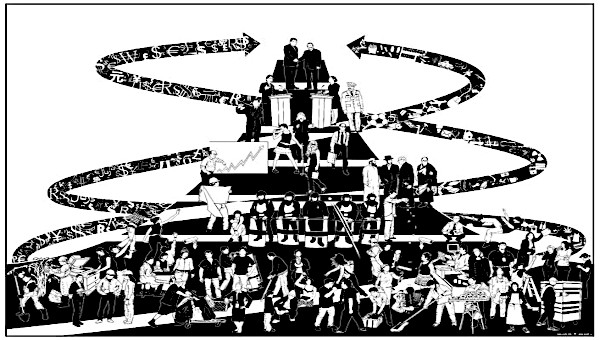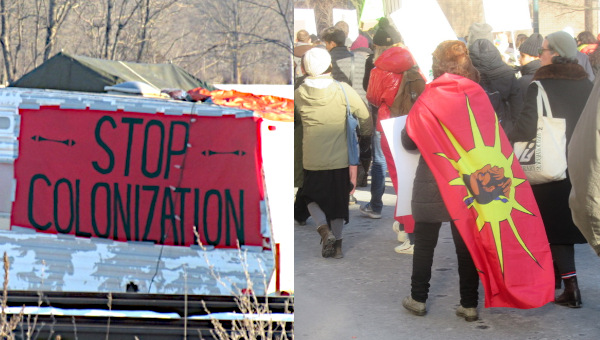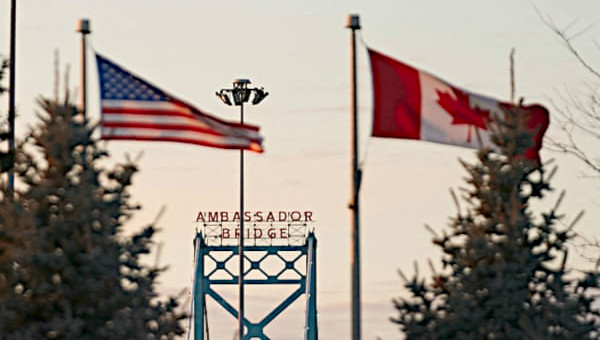Academic Freedom Threatened in Ontario Universities
The last two years have seen increasing efforts to limit advocacy of Palestinian rights at Canadian universities, amounting to a pattern of the suppression of freedom of speech and freedom of assembly. This article, and the Open Letter from Faculty for Palestine for signing on to below, reviews some of these developments in the context of the growing campaign of international solidarity with the Palestinian people.
In the aftermath of the most recent Israeli assault on the Palestinian people, we now know that many buildings of the Islamic University in Gaza have been destroyed, as at least ten bombs have hit this so-called “military target,” including a residence for female students. Students waiting for a bus were hit. How will they hold classes now? Even before this, classes were piecemeal, governed by such unavoidable distractions as failure of electricity and sudden erection of checkpoints. Students in Gaza and in the West Bank struggle to get an education and professors struggle to teach classes. I once ran a workshop on applying to graduate schools in the U.S. and Canada for Palestinian students in which I had to field questions like, how do I explain that I am 35 and still working on a BA because my university was closed for five years and I was imprisoned for two? How do I explain that I can’t get a letter of recommendation because my professor was killed? As we encounter frustrations like too-large seminars and inadequate teaching support, North American academics may have difficulty imagining such dire circumstances as the stuff of daily life.
While most academics would agree that a university should be a place where critical debate is fostered, what is academic freedom when the freedom to attend classes without being bombed isn’t even assured? Academic freedom falters it seems when it comes to Palestine, whether in the Middle East or in North America. Not only is there no realizable academic freedom for Palestinians, but also, even in North America, students and faculty raising critical viewpoints about Israel find themselves muffled, accused of anti-Semitism, threatened with disciplinary action, or, in the case of former Depaul University professor, Norman Finkelstein, out of a job entirely.
In Canada, the annual educational event known at “Israeli Apartheid week,” held on university campuses, has faced repeated attempts to suppress it. What justification can be found to block an event in which scholars and activists speak about the history of the region, with a focus on the illegal occupation of Palestinian territory, information that is taught in history and political science classes and available in books published by university presses? Yet, 125 University of Toronto faculty members signed a letter, published in the National Post, in which they “request[ed] that the administration stop this hateful and divisive event from returning to our University.”
More worrisome, however, is that the administration on some campuses has actually endeavoured to comply, a trend that should alarm anyone who cares about the integrity of their university. In February of last year, the McMaster University administration attempted to ban the use of the term “Israeli apartheid” by Student Union clubs on campus, including “activities promoted under the banner, ‘Israeli Apartheid Week.’” It was only after a concerted protest and huge rally that the administration backed down from what would likely have been an illegal action anyway.
This year’s event has been marked by a similar action at Carleton University. The Israeli Apartheid week poster was banned by the university’s Equity Services because of its graphic, a drawing of an Israeli bomb being dropped on a child, who is labeled “Gaza.” The SAIA (Students Against Israeli Apartheid) chapter was informed that the “image could be seen to incite others to infringe rights protected in the Ontario human rights code.” The interim Provost and Vice President of Carleton, Feridun Hamdullahpur, circulated a letter to the entire Carleton community in which he threatened indefinite expulsion for anyone contravening the code; although vaguely worded, the letter alludes to “harassment and intolerance which can take the form of inappropriately challenging or questioning a person’s race or beliefs.” One has to wonder how this stock anti-war graphic can be seen as “inappropriate,” unless Carleton is concerned to protect Israel’s image rather than the rights of its students to free expression.
York University and the University of Toronto have both witnessed similar attempts to harass students and faculty expressing advocacy for Palestinian rights.
In May of 2008, Professor David McNally, then chair of the Department of Political Science at York, received a disciplinary letter from his dean. His crime? Speaking at an “unauthorized student rally” “by means of amplification.” It turns out that it was no coincidence that the rally in question was a pro-Palestine rally. McNally had spoken at another rally the day before (for the group No One is Illegal) at precisely the same time and in the same space and with the same amplification system and received no disciplinary letter. Hence, he was forced to conclude that the underlying crime was not speaking at an unauthorized rally or by means of any particular audio aids but in fact speaking in support of Palestinian human rights. There was clear evidence of bias. With the help of his union, McNally was able to get the charges dropped. However, he wonders if it might have turned out otherwise, given different circumstances. Would a faculty member with less compelling evidence and less of a public profile and academic stature had to face disciplinary action? McNally relates that several untenured faculty commented nervously on his case. Even if the action against him was eventually withdrawn, it seems to have sent its intended chilling effect to other academics inclined to advocate for Palestinian rights.
Students Against Israeli Apartheid at York and the University of Toronto have also faced disciplinary action. While members of York SAIA admit that they do not always manage to comply with the arcane and nearly impossible rules to get official permits and room bookings through university channels, they do so with the understanding that most other student groups do likewise. However, unlike other student groups, they are fined, their room bookings cancelled, and their group subjected to disciplinary proceedings. In October 2008, SAIA at the University of Toronto discovered that all of its requests for room bookings for their conference, “Standing Against Apartheid” were abruptly denied. Recently, through the freedom of information act,
they were able to obtain the official correspondence behind this action. To their astonishment, they discovered an email trail, going all the way to the University President, discussing what rationale to use to deny them the rooms before they were even booked. From the emails, it is clear that the University of Toronto administration actively conspired to block the event from the university campus, even if they found a loophole to do so.
In 2004, York Social Science Professor David Noble distributed pamphlets after a film screening in which he suggested that there were links between the York University Foundation and Canadian pro-Israel lobbies. The next day, York University administration issued a media release denouncing him. After an arbitration process that took several years, Noble’s name was eventually cleared and the administration was found guilty of violating his academic freedom.
As part of a lengthy report prepared by CAUT (Canadian Association of University Teachers), Noble’s cause and that of others, most prominently Daniel Freeman-Maloy, an undergraduate student and Palestinian activist unjustly expelled from the university, are shown to be part of a larger pattern in which there are “threats to and breaches of the right of free expression and academic freedom at York University.”. Many of the students and faculty whose rights have been violated are those who have been actively involved in advocating for Palestinian rights and indeed the report does contain evidence pointing to a pro-Israel bias among the York administration.
Israeli Apartheid Week raises such ire that Professor Shahrzad Mojab, former Director of the Women and Gender Studies Institute at the University of Toronto, was assailed just for a routine publicizing of the event. She reports that in 2005, the first year of the event, the Institute posted the announcement on its listserve, as it does for any number of other non-Institute events. However, she and staff members received threatening phone calls and email messages from anonymous callers and objection email messages from colleagues on campus. She found herself isolated and nasty slogans were written on an anti-war poster on her office door. Many, even a former President of the university, complained about the use of the Institute’s listserve to publicize the event. One colleague publicly called her an anti-Semite when she was being introduced at a panel. Although Mojab filed a complaint, there has been no follow-through to clear her name. Mojab noted that although the Institute publicized many other “politically-sensitive” and even controversial events, none received this type of reaction.
A pattern of intolerance for speech about Palestinian human rights appears to have established itself in Canadian universities. Supporters of Israel’s military occupation often claim the opposite – that universities are havens for speech against Israel. Certainly, there is “speech against Israel” in terms of events like Israeli Apartheid Week, now in its fifth year at the University of Toronto, that seek to raise critical perspectives about the occupation. Such speech, we should acknowledge, is part of normal academic discourse that examines racism, colonialism, and militarism in their many forms and in general steers clear of promoting government propaganda. Such speech is now under threat in Ontario universities, even as there is a growing interest in having informed and critical discussions about Israel’s military occupation.
In five years, Israeli Apartheid Week has expanded to an event now encompassing about forty cities around the globe.
The recent slaughter of Gaza demonstrates that it is more important than ever for academics to speak out and use the resources of the university to make the world aware of the gross injustices perpetrated by Israel’s military occupation. Academics have been slower to respond than their colleagues in labour unions, many of whom have passed resolutions supporting the BDS (Boycott, Divestment and Sanctions) campaign, a non-violent movement designed to pressure Israel into compliance with international law. Yet, recent weeks have seen momentous change in universities as student unions have signed on to the Palestinian Right to Education campaign and thousands of faculty have signed petitions to condemn the attack on Gaza and express solidarity with Palestinian colleagues. In Montreal,
a group of faculty has endorsed the BDS campaign and in the U.S., Hampshire College has voted to divest from six companies with ties to Israel. As students and faculty raise their voices against the predation of the Israeli army on Palestinian civilians, universities must be made safe spaces for expressing dissent and telling the truth about who is suffering in Palestine. •
FACULTY 4 PALESTINE Open Letter
TO VIEW THE LIST of faculty signatures:
Visit the F4P webpage at: www.caiaweb.org/faculty and CLICK the red icon
(“Click here to view or sign F4P Open Letter”)
TO ADD YOUR NAME and faculty affiliation to the Open Letter:
Send an e-mail to: faculty@caiaweb.org
(In English)
Defend Freedom of Speech
Open Letter to university community regarding Palestinian Rights and Canadian Universities
The last two years have seen increasing efforts to limit advocacy of Palestinian rights on Canadian universities, amounting to a pattern of the suppression of freedom of speech and freedom of assembly. These include:
- Statements from 19 university presidents in the summer of 2007 to foreclose debate on the academic boycott of Israel, citing “academic freedom”
- Visits to Israel by eight university presidents in the summer of 2008, with no equivalent outreach to Palestinian institutions
- Efforts to ban the use of the term “Israeli Apartheid” at McMaster University in February-March 2008, overturned only through a campaign of protest
- Discipline against students involved in peaceful protests for Palestinian rights at York University in March in 2008
- Attempted discipline against a faculty member who addressed a rally against Israeli Apartheid at York University in 2008
- A pattern of cancellation of room bookings for meetings concerning Palestinian rights at the University of Toronto and York University in 2008
- The use of security clearance requirements and fees to cover security costs to impede campus meetings about Palestinian rights
We the undersigned:
- Defend the right to freedom of speech about Palestine for all members of the university community, including freedom to use the term ‘apartheid’ to identify and debate certain policies associated with the state of Israel and the freedom to support, facilitate and participate freely in activities under the rubric of “Israeli apartheid week”
- Call for an end to the silencing of speech around Palestine, removing extraordinary requirements for security clearance and fees for security services
- Support increased ties to Palestinian institutions and scholars, and activities to support the right to education and academic freedom of Palestinians
(en français)
Défendons la liberté d’expression
Lettre ouverte à la communauté universitaire au sujet des droits des Palestinien(ne)s et des universités canadiennes.
Durant les deux dernières années, plusieurs efforts ont été déployés pour restreindre le débat en faveur des droits des Palestinien(ne)s dans les universités canadiennes, à un tel point qu’on voit se dessiner un motif ou un modèle établi de suppression de la liberté d’expression et de la liberté d’association. Par exemple:
- Des déclarations de la part de 19 présidents d’universités, à l’été 2007, évoquant la «liberté académique», et visant à bloquer les débats sur le boycott académique d’Israël
- La visite en Israël de huit présidents d’universités, à l’été 2008, sans les efforts équivalents pour créer des contacts avec des institutions palestiniennes.
- Tentative de faire bannir l’expression «apartheid israélien» à l’université McMaster en février-mars 2008, renversée grâce à une campagne de protestation.
- Mesures disciplinaires contre des étudiant(e)s qui ont manifesté pacifiquement pour les droits des Palestinien(ne)s, à l’université York en mars 2008.
- Tentative de mesures disciplinaires contre un membre de faculté qui a fait un discours lors d’un rassemblement contre l’apartheid israélien, à l’université York en 2008.
- Une habitude d’annuler les réservations de locaux pour des réunions à propos des droits des Palestinien(ne)s, aux universités de Toronto et York en 2008.
- L’exigence d’avoir un service de sécurité et le paiement de frais de sécurité imposés aux organisateurs de réunions à propos des droits des Palestinien(ne)s sur les campus, dans un but dissuasif.
Nous, soussigné(e)s:
- Défendons la liberté d’expression à propos de la Palestine, pour tou(te)s les membres des communautés universitaires, incluant le droit d’utiliser l’expression «apartheid» pour identifier et débattre de certaines politiques associées à l’État d’Israël, ainsi que le droit d’appuyer, d’organiser et de participer librement à des activités dans le cadre de la «semaine contre l’apartheid israélien».
- Demandons que cesse la censure au sujet de la Palestine, par le retrait d’exigences extraordinaires pour la sécurité et de frais pour les services de sécurité.
- Appuyons la création de liens avec des institutions palestiniennes et les membres de facultés palestiniennes, ainsi que les activités en appui au droit à l’éducation et à la liberté académique des Palestinien(ne)s.





